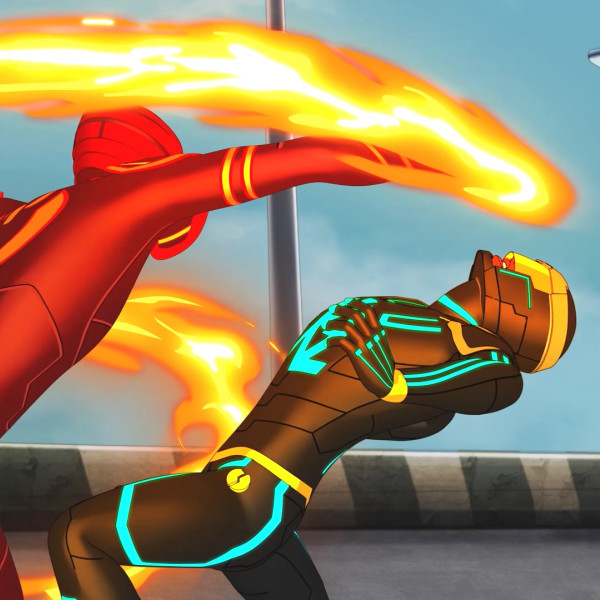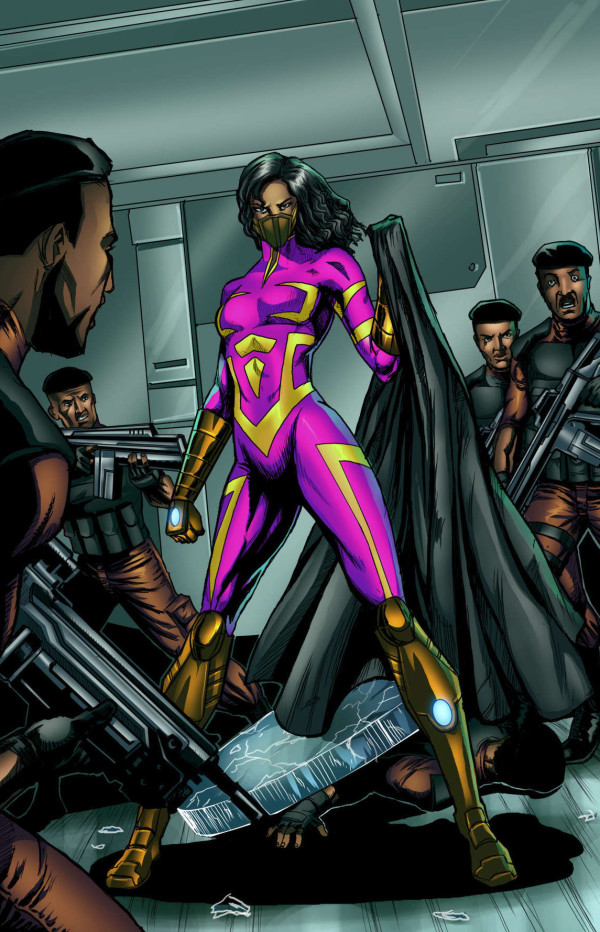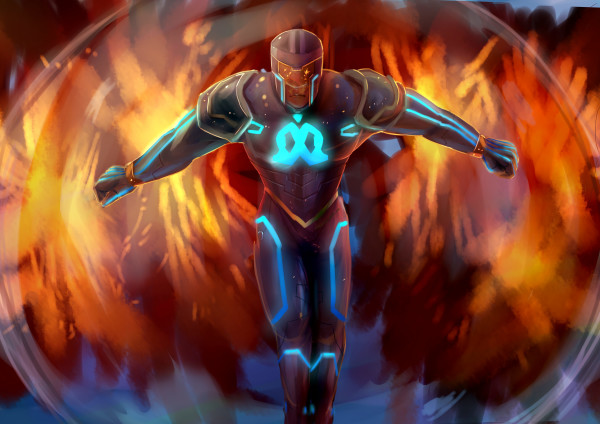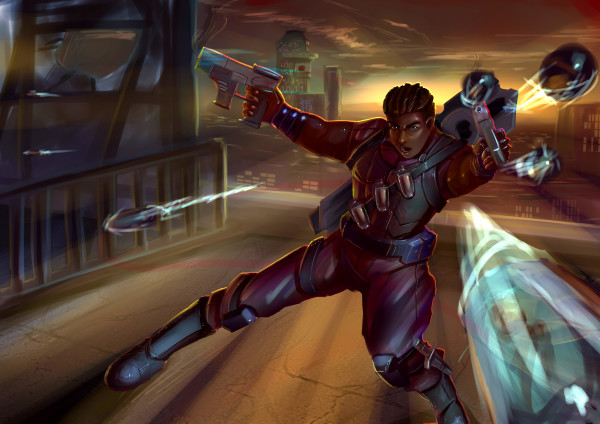Roye Okupe’s E.X.O.: The Legend of Wale Williams – Part One, like many superhero comic books and graphic novels, is a coming-of-age story or, perhaps, an “origin story”— which is more or less the same thing. After all, the moment he or she attains self-knowledge and maturity is also the moment the superhero discovers his or her powers and the responsibilities they entail.
Wale Williams, the estranged son of a wealthy Nigerian scientist, returns home after a five-year hiatus to discover his father missing and thugs (both human and robot) terrorizing Lagoon City—a more or less futuristic Lagos.
In order to save his city and rebuild his family, Wale dons a secret exoskeletal super-suit his father left for him and flies off to fight the bad guys.
There is a love interest with the possibly-also-superheroic Zahra. The story also features loyal friends/sidekicks and a villainous mastermind who may or may not be from Wale’s past.
These character types and plot elements are, of course, familiar to comic book fans the world over.
What distinguishes E.X.O., at least on a superficial level, is that the creative team behind the book is Nigeria-based. Okupe is credited as creator, writer and producer. He is joined by editor Ayodele Elegba, artist Sunkanmi Akinboye, colorist Raphael Kazeem and cover artist Godwin Akpan.
They all work under the umbrella of YouNeek Studios, a venture that Okupe set up to produce and promote this project and, hopefully, others further down the line.
The team, particularly Okupe and Akinboye, whose crisp artwork lends the book a lively energy, is to be commended for producing such an exciting page-turner and for breaking new ground as Afrofuturist comic book authors.
This latter point deserves a closer look.
Most of the international press that E.X.O. has generated has latched onto the “Africanness” of the project. The review that appeared on CNN is titled “Is it time for an African superhero to save the day?”. Mashable declared, “Nigerian superhero puts a fresh face on graphic novels.”
Both of these articles make the important point that E.X.O. succeeds in infusing some much-needed diversity into the superhero genre—much like Marvel’s Black Panther, who is receiving two simultaneous reboots in Captain America: Civil War and in the new comic book written by Ta-Nehisi Coates.”
E.X.O. is an African-born superhero whose superheroics don’t fall back on tired stereotypes of the African continent as a war-torn, poverty-stricken dystopia. If anything, E.X.O.’s adventures in Lagoon City prove that high-tech villainy is a global problem.
It is possible, of course, to see E.X.O. as a literary document in and of contemporary Nigeria. Wale Williams’ father’s work on clean energy, which recalls the Stark family’s work on the Arc Reactor in the Iron Man comics, is instrumental in eventually creating a certain superhero suit. This emphasis on clean energy suggests parallels with the broader tradition of petro-fiction and Nigeria’s recent history of oil-fueled boom and bust.
There is also an interesting, partially sublimated debate about the merits of military government running underneath E.X.O.’s disquisitions on good and evil that cannot help but recall the careers of Nigeria’s ruling generals.
The fate of Omile, a working-class neighborhood of Lagoon City that a shady tech company hopes to raze to make way for shiny chrome expansion, is deftly tied into larger debates ongoing in many African cities, including Lagos, about the equity of development and the corporate takeover of civic life.
In short: variously allegorical readings of E.X.O. abound, and scholars of Nigerian literature will no doubt refine and deepen them, exposing their real political stakes.
 But perhaps these readings take us too far afield. Does touting the “Africanness” of African comic book superheroics necessarily reduce Wale Williams’ adventures allegories of a nation in crisis? I think not.
But perhaps these readings take us too far afield. Does touting the “Africanness” of African comic book superheroics necessarily reduce Wale Williams’ adventures allegories of a nation in crisis? I think not.
If we take Okupe’s interviews with CNN and Mashable and Okayafrica at face value, it is clear that what is at stake with E.X.O. is Nigeria’s entry into the worldwide superhero comic ecology. This ecology has its own rules, largely determined by the market, and Okupe seems content to play by them.
Unlike other Afrofuturists, Okupe hasn’t yet demonstrated a desire to break in any overt way with prevalent modes of myth-making.This notwithstanding, making a comic like E.X.O. has definite value, especially within the world of mainstream comic books, where remixes and innovation within the form are privileged over outright reinvention.
There is nothing radically new about Wale Williams’ origin story. There is also a real debate to be had as to what contributing “diversity” to global comic book capitalism actually accomplishes.
All of that aside, however, adding a new African superhero to the pantheon is a significant achievement. We should all eagerly await Part Two.
Click here to buy E.X.O.: The Legend of Wale Williams – Part One
***********
All images used by permission of Youneek Studios.
About the Author:
 Joshua Williams is a writer, director, translator and scholar of East African theatre and performance based at the University of California, Berkeley. His essays and articles have appeared in Africa is a Country, HowlRound, Blunderbuss, Hippocampus, Theatre Journal, Theatre Survey and the Johannesburg Salon. jdmwilliams.com
Joshua Williams is a writer, director, translator and scholar of East African theatre and performance based at the University of California, Berkeley. His essays and articles have appeared in Africa is a Country, HowlRound, Blunderbuss, Hippocampus, Theatre Journal, Theatre Survey and the Johannesburg Salon. jdmwilliams.com














COMMENTS -
Reader Interactions